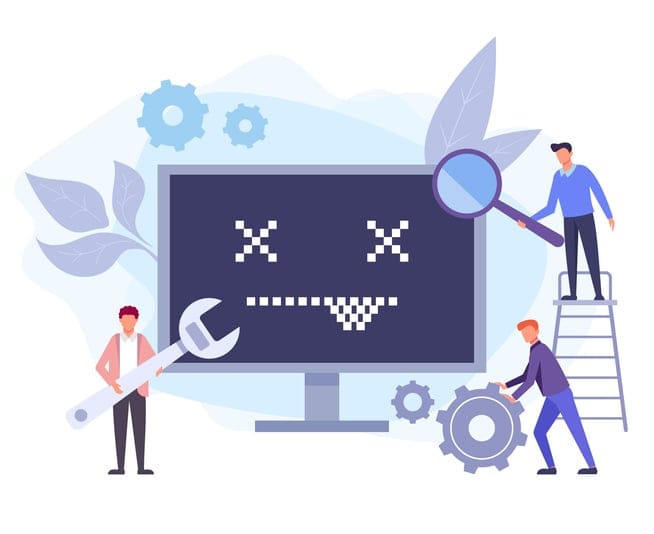
Want to know how much website downtime costs, and the impact it can have on your business?
Find out everything you need to know in our new uptime monitoring whitepaper 2021







Have you found yourself asking this question when seeing website monitoring solutions flash up on Google? Has your dev team been trying to convince you to get a monitoring tool but you’re not sure what the benefits are? Don’t worry, I’ve compiled a list of the top reasons why website monitoring is so important to you and your website. But you don’t have to take my word for it, read on and find out.
If visitors can’t access your site, they’re going to jump straight off and go to your competitors
If, for example, you’re having a sale for Black Friday, you’ll be having higher than average traffic levels to your site – if your servers then can’t hold that traffic, your site will go down and you will miss out on all of those potential sales.
According to an online report by Gartner, full website downtime costs the average small or medium-sized company $5,600 per minute, equating to $336,000 an hour.
Our most expensive website downtime blog gives this shocking example:
The most expensive period of downtime on record also involved Amazon, though this time they weren’t on the receiving end. In March 2017, an employee error took down a large number of websites hosted on AWS (Amazon Web Services). Initially, it appeared that publisher websites were mainly affected, but S&P 500 and U.S. financial services companies are also thought to have been hit by the four-hour outage. According to a report by Axios, the AWS downtime could have incurred losses of $150 and $160 million for the S&P 500 and financial services companies affected.
With so many online hackers and malicious threats online these days, it’s more important than ever to not only ensure that you have an SSL certificate but you make sure that, 1) it’s set up correctly to ensure it has the added safety that you set out for it to have 2) that it hasn’t expired, and 3) that it is genuinely keeping those hackers at bay.
How do you know a website has an SSL certificate? HTTPS! and that security-ensuring padlock. It looks like this:

According to a recent survey we conducted at StatusCake, customers were 93% less likely to buy from a website that didn’t have an SSL certificate. Of those 93%, 100% of them knew to look out for the padlock to see if the website was safe and secure to use.
Most people don’t know that their domains can get hijacked – they think that once they’ve bought the domain, it’s theirs for life and there’s no way anyone can take it. Wrong. If you don’t have website monitoring keeping an eye on your domain for you, how would you know if there was any suspicious background activity going on?

Not convinced it can happen? Even Google’s domain was hacked in Vietnam by “Lizard Squad”. Back in 2015, a group of hackers used DDoS to nab Google’s domain, and when anyone wanting to use the search engine landed on the website, it would show them hacking tools! Find out more about domains that have been hijacked.
Servers exceed their threshold regularly but unless you have resources constantly checking your servers, how would you know? Even if you do, by the time they know there’s a server issue, it might be too late – your website could be down. That’s why StatusCake offers you server monitoring so you can get alerted before this happens, meaning you can do something about it before it impacts your website – piece of cake!
We’ve spent so much time drilling in the importance of page speed on your website, more so than ever now that Google’s Core Web Vitals are completely reliant on the speed that your website loads. But how do you know if your website is slow unless you’re constantly monitoring it? The easy answer is that you don’t. Simply putting each and every page into Google Insights isn’t viable, after all, you’d have to do it every second of every day and really, who has time for that? That’s why having page speed monitoring in place as part of your overall website monitoring suite saves you time, money, and ultimate, from the curse of website downtime!
Share this

3 min read For any web developer, DevTools provides an irreplaceable aid to debugging code in all common browsers. Both Safari and Firefox offer great solutions in terms of developer tools, however in this post I will be talking about the highlights of the most recent features in my personal favourite browser for coding, Chrome DevTools. For something

6 min read There has certainly been a trend recently of using animations to elevate user interfaces and improve user experiences, and the more subtle versions of these are known as micro animations. Micro animations are an understated way of adding a little bit of fun to everyday user interactions such as hovering over a link, or clicking

2 min read Read about the latest websites that have experienced downtime including Netflix, Twitter, Facebook and more inside!

2 min read Read about how Google suffered an outage due to the soaring temperatures in the UK in July and how they rectified it right here!

3 min read See the results of our website downtime survey to see some of the most shocking and surprising stats! You won’t be disappointed.

6 min read Find out everything you need to know about Dark Mode and what you can do, as a developer, to make it easier to use.
Find out everything you need to know in our new uptime monitoring whitepaper 2021